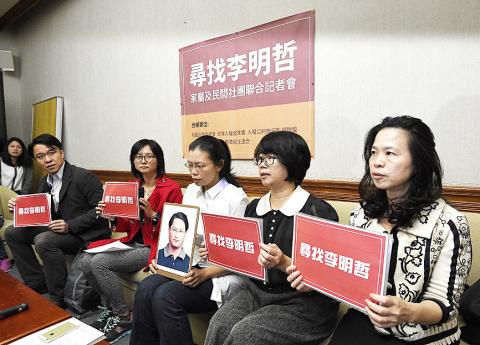The government should take a tough stance over the disappearance of Taiwanese human rights advocate Lee Ming-che (李明哲), family members and human rights advocates said yesterday, while calling on the Chinese government to issue an official statement on his status.
Lee, a former Democratic Progressive Party (DPP) staffer who works at Taipei’s Wenshan Community College, disappeared after entering China from Macau on Sunday.
“He did not contact me as planned, did not check into his hotel and his mobile phone is unreachable,” Lee’s wife, Lee Ching-yu (李淨瑜), said at a news conference with human rights advocates at the legislature in Taipei.

Photo: Chen Chih-chu, Taipei Times
“I do not want to be yet another family member making a scene, but it has already been five days. If the Chinese government has detained or arrested my husband, please tell us why,” she said.
Lee Ming-che had gone to China to “preach” and “share” Taiwan’s experience of democratization with his Chinese friends, she said, adding that her main objective in going public was to prevent Chinese authorities from “splashing dung” on his reputation by framing him with trumped-up charges.
“I cannot protect his body, but I can protect his honor,” she said, “[Lee Ming-che] has always cared deeply about human rights in China and if that is the reason he has been arrested, we are willing to face the consequences.”
Taiwan Association for China Human Rights chairman Yang Hsien-hung (楊憲宏) said the Chinese government routinely denies arrests it says are made for the “purposes of national security.”
The Mainland Affairs Council earlier this week said that it had sought to contact Chinese authorities about the case, but had failed to receive any response.
It urged workers at Taiwanese non-governmental organizations (NGOs) traveling to China to be cautious, saying that harsher rules granting security organizations broader authority to detain foreign NGO employees had increased the risks.
Taiwan Association for Human Rights secretary-general Chiu E-ling (邱伊翎) said the council’s response was “disappointing.”
“If promoting universal human rights and democratic values is right, the government’s response to this kind of disappearance should not just be to warn NGO workers going to China to be more careful,” she said, calling on President Tsai Ing-wen (蔡英文) to personally issue a proactive response.
The Chinese government should publish available video footage of Lee Ming-che and announce how it intends to handle his disappearance if it denies arresting him, she said.
“Our government has issued only weak responses to China restricting our citizens’ freedom of movement for a long time now — we need it to issue an official statement [condemning the disappearance],” Judicial Reform Foundation executive director Kao Jung-chih (高榮志) said, adding that the council’s actions were “passive.”

A car bomb killed a senior Russian general in southern Moscow yesterday morning, the latest high-profile army figure to be blown up in a blast that came just hours after Russian and Ukrainian delegates held separate talks in Miami on a plan to end the war. Kyiv has not commented on the incident, but Russian investigators said they were probing whether the blast was “linked” to “Ukrainian special forces.” The attack was similar to other assassinations of generals and pro-war figures that have either been claimed, or are widely believed to have been orchestrated, by Ukraine. Russian Lieutenant General Fanil Sarvarov, 56, head

SAFETY FIRST: Double the number of police were deployed at the Taipei Marathon, while other cities released plans to bolster public event safety Authorities across Taiwan have stepped up security measures ahead of Christmas and New Year events, following a knife and smoke bomb attack in Taipei on Friday that left four people dead and 11 injured. In a bid to prevent potential copycat incidents, police deployments have been expanded for large gatherings, transport hubs, and other crowded public spaces, according to official statements from police and city authorities. Taipei Mayor Chiang Wan-an (蔣萬安) said the city has “comprehensively raised security readiness” in crowded areas, increased police deployments with armed officers, and intensified patrols during weekends and nighttime hours. For large-scale events, security checkpoints and explosives

A magnitude 7.0 earthquake struck off Yilan at 11:05pm yesterday, the Central Weather Administration (CWA) said. The epicenter was located at sea, about 32.3km east of Yilan County Hall, at a depth of 72.8km, CWA data showed There were no immediate reports of damage. The intensity of the quake, which gauges the actual effect of a seismic event, measured 4 in Yilan County area on Taiwan’s seven-tier intensity scale, the data showed. It measured 4 in other parts of eastern, northern and central Taiwan as well as Tainan, and 3 in Kaohsiung and Pingtung County, and 2 in Lienchiang and Penghu counties and 1

‘POLITICAL GAME’: DPP lawmakers said the motion would not meet the legislative threshold needed, and accused the KMT and the TPP of trivializing the Constitution The Legislative Yuan yesterday approved a motion to initiate impeachment proceedings against President William Lai (賴清德), saying he had undermined Taiwan’s constitutional order and democracy. The motion was approved 61-50 by lawmakers from the main opposition Chinese Nationalist Party (KMT) and the smaller Taiwan People’s Party (TPP), who together hold a legislative majority. Under the motion, a roll call vote for impeachment would be held on May 19 next year, after various hearings are held and Lai is given the chance to defend himself. The move came after Lai on Monday last week did not promulgate an amendment passed by the legislature that